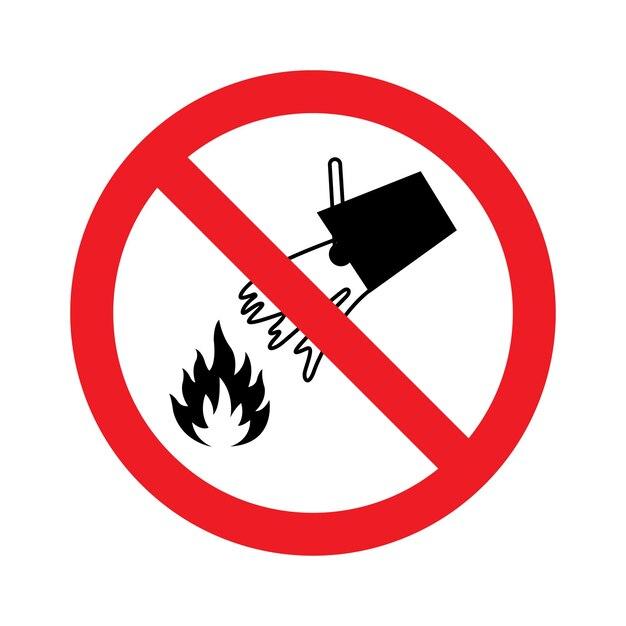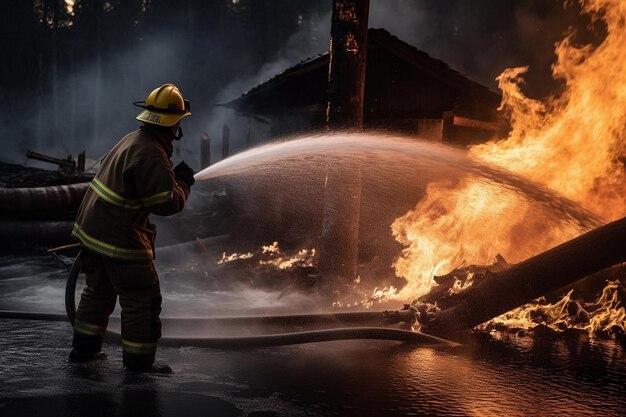Have you ever wondered what to do if you see an electrical fire in your home? It’s a scary situation that can happen due to various reasons, such as faulty wiring or overloaded circuits. When faced with an electrical fire, your first instinct might be to grab a nearby bucket of water and pour it on the flames. But is this the right approach? In this blog post, we will explore whether or not you can use water to extinguish an electrical fire.
One of the key things to remember is that water should never be used to put out an electrical fire. While water is an effective tool for dousing most fires, it can actually make an electrical fire worse and put you at greater risk. In fact, pouring water on an electrical fire can lead to electrocution or even a more intense fire, as water conducts electricity and can spread the flames.
But if water is not the solution, then what is? Stay tuned as we delve into alternative methods of tackling electrical fires, from the appropriate fire extinguisher to other safety precautions you should take. Let’s explore this important topic and ensure you’re equipped with the knowledge to respond effectively in case of an electrical fire.
Can You Pour Water On an Electrical Fire
If you find yourself face to face with an electrical fire, your first instinct might be to grab the nearest bucket and douse it with water. But hold your horses! Pouring water on an electrical fire is not only ineffective but can also be downright dangerous. Let’s explore why.
Understanding the Nature of Electrical Fires
Before we dive into the dos and don’ts, it’s essential to understand what we’re dealing with. Unlike your regular bonfire, electrical fires are caused by a flow of electric current gone wild. When electrical equipment malfunctions, it can generate intense heat and sparks, igniting surrounding flammable materials.
Water and Electricity: A Volatile Mix
Water and electricity have a long-standing love-hate relationship, and it’s definitely not a match made in heaven. Water is an excellent conductor of electricity, meaning it provides an easy path for the current to flow. So, pouring water on an electrical fire can actually worsen the situation by assisting the flames and potentially putting you in harm’s way.
Risk of Electric Shock
Remember those sparks we mentioned earlier? Well, when water comes into contact with an electrical fire, it can create a powerful explosion due to the rapid conversion of water to steam. Not only can this blast scatter burning debris, but it can also lead to electric shock if you’re in close proximity. And let’s be honest, getting zapped is no one’s idea of a good time.
The Proper Response: Cut Off the Power
When faced with an electrical fire, it’s crucial to prioritize your safety and take the appropriate actions. The first step is to cut off the power source. If you can do so safely, switch off the main power supply or unplug the affected equipment. This will help interrupt the flow of electricity and prevent the fire from spreading.
Using a Fire Extinguisher
Now, back to our friendly fire-fighting tool, the trusty fire extinguisher. When used correctly, a Class C fire extinguisher specifically designed for electrical fires can effectively smother the flames without the risk of electrical conductivity. Remember to aim at the base of the fire and sweep from side to side. Don’t forget the cardinal rule: safety first!
Calling for Professional Help
Sometimes, despite your best efforts, an electrical fire can be stubborn to extinguish. In such cases, it’s crucial to call for professional help, such as the fire department or a licensed electrician. These experts are equipped with the knowledge, skills, and specialized equipment to handle electrical fires safely and effectively.
While water may quench many fires, it’s not a magic solution for electrical fires. Pouring water on an electrical fire can lead to more harm than good, putting you at risk of injury or even electrocution. Remember to prioritize your safety, cut off the power source, and if necessary, use a Class C fire extinguisher. And always seek professional assistance when dealing with electrical fires. Stay safe, fellow fire warriors!
FAQ: Can You Pour Water on an Electrical Fire
Welcome to our comprehensive FAQ-style guide on whether water can be used to put out an electrical fire. From the safety of your home to emergency situations, we’ve got you covered with answers to all your burning questions (pun intended). So, grab a seat and let’s dive in!
What would cause an outlet to catch fire
Outlets can catch fire due to a variety of reasons, including overloaded circuits, faulty wiring, damaged outlets or appliances, and even rodents chewing on wires. It’s essential to have regular electrical inspections and be mindful of any signs of overheating or sparking to prevent a potentially hazardous situation.
Should never be used in case of an electric fire
Absolutely! Under no circumstances should you ever use water to extinguish an electrical fire. Water conducts electricity and can result in severe electric shock or even electrocution. Your best bet is to cut off the power supply to the affected area and use an appropriate fire extinguisher.
How do you tell if there is a fire in your wall
Detecting a fire hidden within your walls can be challenging, but there are a few signs to look out for. Pay attention to the smell of burning or scorching, discolored outlets or switches, warm spots on the wall, or a sudden increase in temperature. If you suspect a fire, evacuate immediately and call the fire department.
Can you smell an electrical fire
Yes, you might be able to smell an electrical fire. It’s often described as a strong, acrid odor similar to burning plastic or rubber. If you notice this distinctive smell, take it seriously, investigate the source cautiously, and never hesitate to contact emergency services.
What is the quickest way to put out a fire
The quickest way to extinguish a fire depends on the type of fire you’re dealing with. For electrical fires, the most effective approach is to use a Class C fire extinguisher specifically designed for electrical equipment. Remember, it’s crucial to read the instructions and have the correct extinguisher readily available beforehand.
Does water put out fire
While water is fantastic for dousing many types of fires, it is not suitable for electrical fires. Water conducts electricity and might cause the fire to spread or put you at risk of electrocution. Instead, use appropriate fire extinguishers or fire suppression methods specifically designed for electrical fires.
Why water should not be used to put out an electrical fire
Water is essentially an electrical conductor and can escalate the danger when used to put out an electrical fire. Instead of extinguishing the flames, it can fuel the fire, spread it, or lead to electric shock. Your safety should always be the top priority, so avoid water when it comes to electrical fires.
Does salt put out electrical fires
Salt, unfortunately, does not extinguish electrical fires. Similar to water, salt is a conductor of electricity and can actually worsen the situation. It’s crucial to use appropriate fire suppression methods and have the right type of fire extinguisher nearby, especially for electrical fires.
How do electrical fires start in walls
Electrical fires within walls typically start due to faulty wiring, damaged outlets, or overheated circuits. Overloading electrical circuits, using frayed wires, or improper installation can all increase the risk of electrical fires hidden within your walls. Regular inspections and maintenance by qualified professionals can help prevent such incidents.
Does water make electrical fires worse
Water definitely makes electrical fires worse. Instead of smothering the flames, water conducts electricity and can fuel the fire, cause it to spread rapidly, or create dangerous electric currents. Always remember to avoid water when dealing with electrical fires and opt for proper fire suppression methods instead.
Should you throw flour on a grease fire
No, you shouldn’t attempt to fight a grease fire with flour. Although flour might seem like a handy solution, it can actually exacerbate the fire by fueling it or causing it to spread. In case of a grease fire, the best action is to cover the flames with a metal lid or use a Class B fire extinguisher specifically designed for flammable liquids.
Will baking soda put out a fire
Yes, baking soda can extinguish certain types of fires, including small grease fires or those caused by flammable liquids. Baking soda works by smothering the flames and interrupting the chemical reaction of the fire. However, it’s important to note that baking soda may not be sufficient for larger or more intense fires.
When should you use water on an electrical fire
Water should never be used on an electrical fire. Regardless of the situation, using water can escalate the danger, increase the risk of electrocution, or cause the fire to spread rapidly. It’s crucial to remember that electrical fires require specialized fire extinguishers designed to suppress electrical flames safely.
How do I put out an electrical fire
To safely put out an electrical fire, start by cutting off the power supply to the affected area. Then, use a Class C fire extinguisher designed for electrical fires to extinguish the flames. If the fire is more significant or you’re unsure about handling it, evacuate immediately and call emergency services.
Which extinguisher is most suitable for oil fires
When dealing with oil fires, Class K fire extinguishers are the most suitable. These extinguishers are specifically designed for fires involving cooking oils, greases, and fats commonly found in kitchens. Always ensure you have the appropriate extinguisher nearby when cooking with oil to prevent potential disasters.
What to do if there’s an electrical fire
If there’s an electrical fire, the first step is to ensure your safety and the safety of others. Cut off the power supply, evacuate the area, and call the fire department immediately. Attempting to handle the fire yourself should only be done if you have the necessary knowledge, experience, and appropriate fire suppression equipment.
Can flour put out an electrical fire
Flour is never the go-to solution for extinguishing an electrical fire. In fact, throwing flour on an electrical fire can have disastrous consequences, as it can fuel the flames and cause them to spread. Remember, safety should always be the priority, so keep those bags of flour far away from electrical fires.
What happens if you pour water on an electrical fire
Pouring water on an electrical fire is incredibly dangerous. The water conducts electricity, leading to the risk of electric shock or electrocution. Instead of extinguishing the flames, it will likely intensify the fire, put lives at risk, and cause extensive damage. Make sure to reach for the appropriate fire suppression method and keep water far away from electrical fires.
Congratulations! You’re now armed with essential knowledge about whether it’s safe to pour water on an electrical fire. Remember, understanding the risks and taking appropriate action is vital when faced with such situations. Stay safe, keep calm, and be prepared to tackle fires using the correct methods!

